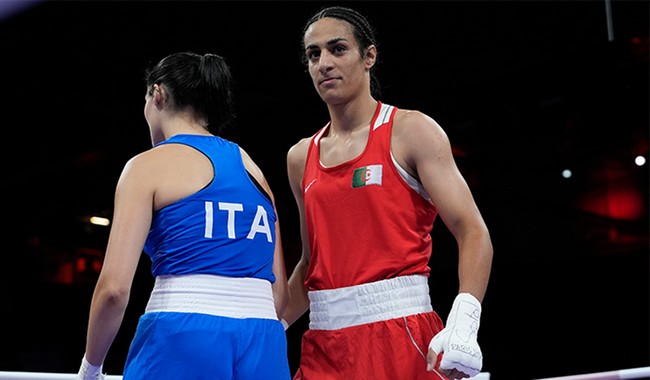
One of the most iconic images that will be remembered of the Paris Olympics is the image of boxer Angela Carina on her knees in tears when she forfeited her match after 46 seconds in the ring with Imane Khelif, an opponent who previously failed a sex test.
RedState’s Bonchie reported on the bout:
Shocking video showed Italy’s Angela Carini being pummelled by Imane Khelif of Algeria (who now claims to be “intersex” but has XY chromosomes). Less than a minute into the fight, Carini called time. Upon re-entering, she immediately took another punch and withdrew. Preliminary reports are that her nose was broken.
Related: WATCH: Female Olympian Forfeits After Being Forced to Fight Athlete Believed to Be ‘Trans’
We should never let the organisers forget what they did to #AngelaCarini, I want these images to haunt them. pic.twitter.com/Cji1MKNyIO
— IanG 🎗️ (@IanGee2023) August 1, 2024
Could any picture sum up our new men’s rights movement better? The smirk of a male who’s knows he’s protected by a misogynist sporting establishment enjoying the distress of a woman he’s just punched in the head, and whose life’s ambition he’s just shattered. #Paris2024 pic.twitter.com/Q5SbKiksXQ
— J.K. Rowling (@jk_rowling) August 1, 2024
However, it didn’t take long after the initial viral wave of rage about the incident for virtue signalers to come out everywhere.
[@elonmusk] You have to ask for an apology, the Algerian boxer Imane Khelif was born a girl and she is a woman.
There is no longer the superior race
#ImaneKhelif #imanekhelifiswomen pic.twitter.com/HtSUVY9Sob— Dr. DIB Athmane 🇩🇿 (@dib_athmane) August 1, 2024
The International Olympic Committee spokesperson, Mark Adams, made a statement defending Khelif, asserting, “Scientifically…this is not a man fighting a woman.”
IOC spokesman Mark Adams: Algerian boxing #Imane_Khelif Female, born female, lived her life female, and boxing as female@elonmusk listen carefully
Stooop bullying ❌#IstandWithImaneKhelif pic.twitter.com/IMxT2F7QYC— _ALGFOOT✍️⚽️ (@ALGFOOT_) August 2, 2024
Imane is said to have DSD, “Difference of Sexual Development.” This condition is why she was identified as a girl at birth and raised as a girl, but also shows high levels of testosterone.
They are not “intersex” — ie between or a “mix of” the two sexes — because no one is. They almost certainly have 5-ARD: they are biological males with XY chromosomes but whose bodies lack the receptor that creates external male genitalia.
In developing countries many are read as female at birth and raised as girls. But at puberty their internal testes start producing testosterone at normal levels so they acquire most of the strength, muscle mass, height and power of other men. In other words, they experience male puberty after which many start living as men.
This is undoubtedly a troubling situation in which empathy is due. Imane was born with a complex condition through no fault of her own. There is reason why some would feel that she should not be excluded. But the question remains if people with DSD should still be allowed in women’s sports where their hormonal and developmental differences not only can offer an advantage but can cause injury to other women; just like Carini said, she had never been hit so hard before as when Khelif punched her.
After taking questions, Mark Adams said, “I hope we are all agreed we aren’t going to go back to the bad old days of sex testing.”
That’s a bad thing? First off, testing for doping is much more invasive and is a recognized universal way to ensure that there is no cheating. And it is considered cheating, even in male sports, to take drugs that give you an abnormal physiological advantage over your opponent.
Even as we have compassion for people like Khelif, we must remember that women’s sports were created to offer a protected space for the millions of females around the world who previously did not have their own arena. Inclusivity of a minority, even if well-intentioned, at the expense of the majority is injustice. Asking all women to sacrifice their safety and opportunities so that a few select women who were born either male or intersex is wrong.
When there is a moral conundrum, sometimes you have to choose what is more right. It is right that people with DSD should be treated with compassion and be able to find their place in the world. It is more right that women’s sports be protected for biological females everywhere.
This is why the Right is often called anti-trans, or in this case, anti-DSD. In reality, it’s not that we are anti-anything, but rather pro-woman.
Who are the people making these decisions for female athletes everywhere? Have the female athletes been consulted? Where are the feminists defending women’s rights to a safe and fair playing field?
As women, we have a responsibility to advocate for our rights and the protection of our spaces. We must also debunk the lie that doing so means we are unfairly excluding others. But truly, only a woman would be expected to include others at her cost anyway, right? Inclusivity of a minority at the expense of a majority is not equality — it’s preference, and it has no place in women’s rights.
